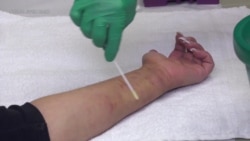No one knows yet what causes eczema, the collective name for a group of skin conditions that result in itchy, red patches on the skin. Eczema can appear on any part of the body, and it can be a lifelong affliction. Most often, it affects children, but adults can get it, too.
Ava Segur developed eczema shortly after she was born. She's now a teenager. Segur says she used to wear long-sleeved shirts to hide the bumps and rashes. Her mother, Stephanie Segur, says doctors were trying to get the eczema under control when Ava suddenly developed food allergies at about 18 months old.
This turned out not to be a coincidence, but part of something called "Atopic March," a genetic tendency to develop allergic diseases.
“Probably a third of patients with eczema develop a food allergy,” said Dr. Donald Leung, an allergist and immunologist at National Jewish Health, a research hospital in Denver, Colorado, where Atopic March is studied.
Eczema patients have dry, cracked skin. If children have food particles on their fingers or underneath their nails, food can enter the body through the skin, instead of through the digestive tract. Other environmental allergens such as pollen can penetrate, as well.
Heather Karazim recalls that when her daughter, Lucie, was a baby, she would scratch until her skin bled. Karazim constantly worried about infections.
Leung says patients with eczema should see an atopic dermatitis expert to get control of the eczema quickly and to prevent the progression of Atopic March. Research shows that a warm, not-hot, 20-minute bath, followed by a thick moisturizer or ointment, helps rebuild the skin barrier. The ointment keeps a film of water on the skin and prevents it from evaporating.
Wet wraps can be put on a child's arms and legs, covered by dry clothing. Mitts prevent babies from scratching; wrapping the head also seals in moisture.
Eczema is a troublesome skin condition. It's itchier at night, and can interrupt the child's and the parents' sleep. The disease can impact the entire family, especially if it interferes with a parent or caregiver's ability to work. And there's the emotional impact of not being able to soothe the baby.
Kristen Kline, whose infant son has eczema, says she "can’t even explain the relief that we’ve really gotten from (treatment).” She said it's "huge" that the soak and seal treatment can prevent future allergies.
Researchers are developing a way to test every element of the skin so they can identify what weakens the skin barrier and repair it before children develop potentially lifelong issues.





